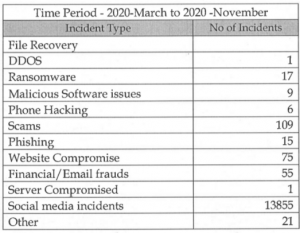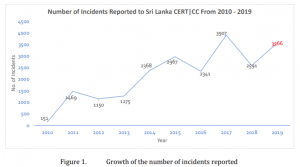2020! It has been a year that has sticked people globally with the Internet. Sri Lanka is also no exception for this. It was able to observe and experience the state of education, business, communication, etc., which is fully implemented through websites. We need to think about the other side of the Internet while enjoying the great benefits through it.
We know that scams and violence on the Internet continue to be reported worldwide. We received from the Sri Lanka Computer Emergency Readiness Team (SLCERT) through the Right to Information Act the incidents reported in Sri Lanka only during a specific period from March to November.

We were also able to obtain data on the 2019 Annual Report released by the Sri Lanka Computer Emergency Readiness Team on cyber crimes and frauds reported over the past 10 years.
(https://www.cert.gov.lk/Downloads/General/Sri_Lanka_CERT_Annual_Activity_Report_2019.pdf)

Based on these statistics, there is a continuous increase in complaints from cyber users.

Based on these two data, the maximum number of complaints registered on social media in the last 10 years is 3685. However, the number of social media complaints registered in the first 9 months of this year was 13,855. It can be observed that the complaints on social media have increased manifold.
In Sri Lanka, 65% of young people who use social media reveal their email addresses, while 47% disclose their phone numbers. And 24% of young social media users have never changed their password. SLCERT’s strategic data from 2019 to 2023 indicate that 30% of users do not know how to use passwords to protect important documents.
(https://www.cert.gov.lk/Downloads/NCSStrategy.pdf)
Despite reports from various sectors about the safety of Internet users and security measures, the figures for this particular 9-month period show that we are forgetting our security and perpetuating crime and violence online.
Recent Comments